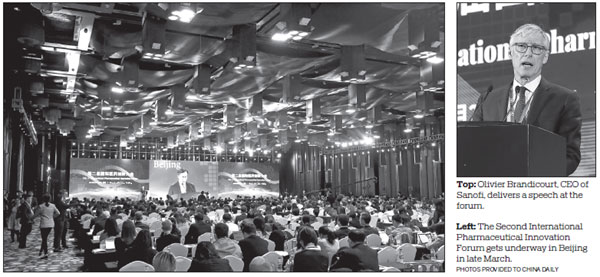French Pharma Giant Injects More Investment into China
French multinational pharmaceutical company Sanofi is to up its investment in China, introducing innovative drugs to further tap into the potential of the domestic market, its top executive said.
Olivier Brandicourt, CEO of Sanofi, said that the company has decided to set up a research institute, dedicated to the specific needs of the Chinese market, in the city of Suzhou, Jiangsu province.
The company entered China in 1982. Recently, it invested 66 million euros ($74.13 million) in its Global R&D Operations Hub focused on digitalization and big data in Chengdu, Sichuan province.
"This global research institute, which will focus on breakthroughs in early-stage medical research, will put China at the same level as France, the United States and Germany," Brandicourt said, after delivering his keynote speech at the Second International Pharmaceutical Innovation Forum held in Beijing recently.
The IPIF is a biennial international conference organized by the R&D-based Pharmaceutical Association Committee or RDPAC. Its aim is to create a high-level dialogue and collaboration platform between leaders of China's healthcare innovation ecosystem, in order to accelerate the nation's world-class innovation and better meet the common needs of global patients.
During the interview, Brandicourt said Sanofi had launched its China and Emerging Markets Global Business Unit on Jan 1, focusing on the unique characteristics and tremendous growth opportunities in emerging markets, particularly in the country.
"Sanofi's R&D focuses on unmet medical needs, such as oncology, immunology and metabolic diseases in China and the rest of the world," he said.
"Beyond our own R&D facilities, we also want to make sure that we are scaling up emerging science in China and we are developing the appropriate partnerships in order to benefit from innovations that can emerge from China."
Sanofi has its own China 2030 Strategy, which calls for more investment in order for China to be systemically part of any global development for any asset, and that any innovative product the company will develop will be done so with and for China. This is because China is Sanofi's second largest market after the US, and "clearly, China is now part of our global strategies because it's part of our global development plans," Brandicourt said.
The company already has an insulin plant in Beijing, which has been approved by the Japanese, the Australian, and the European regulatory authorities to export insulin products to their country or region.
The Beijing plant has become one of the major production sites for Sanofi's insulin product, which is supplied to the Chinese and Australian markets. It has obtained the qualification to be exported to Japan and will also serve the Asia-Pacific market in the future. Since 2012, more than 130 million doses of the drug have been produced.
The CEO welcomed China's recent policies and healthcare reforms, spoke highly of China's importance in the international pharmaceutical innovation system, and said Sanofi is expected to launch 16 new products in China from 2018 to 2025.
Chinese regulators have been streamlining and accelerating new drug approvals in recent years, and statistics from the National Medical Products Administration show China approved a total of 48 new medicines in 2018, in a time period 12 months shorter than previous approval times.
Another Sanofi's medicine took only 58 days from drug license approval to commercial launch, breaking the launch record among all treatments for rare diseases in China.
Because people now are more demanding when it comes to healthcare, it is advantageous for the company to bring to China more sophisticated technology for developing in the specialty segment of medicine, and the Chinese government has taken specific action to approve recently more oncology drugs, providing a strong incentive to develop the company's specialty products for China, according to Brandicourt.
The growth rate of Sanofi in China in 2018 was about 12 to 13 percent, higher than that in the US, and China contributes more than 7 percent of the total turnover. The growth rate should continue to be significant because of the large needs of Chinese patients, he predicted.
Regarding the future of China's healthcare system, Brandicourt put forward five suggestions, including delivering integrated care, improving procurement, shifting to primary medical care and prevention, and developing supplementary medical insurance.
More than 400 people, including government officials, corporate executives, academic experts and NGO representatives, attended this year's forum.

(China Daily 04/09/2019 page11)














